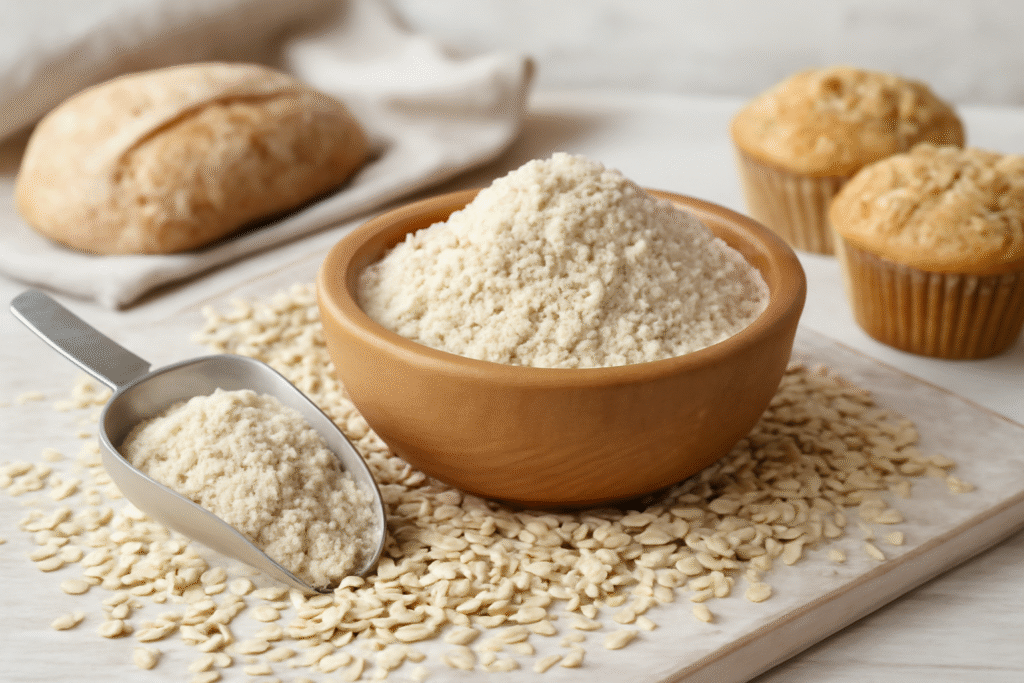The popularity of oat flour has grown tremendously in recent years. More health-conscious individuals are shifting from traditional wheat flour to alternatives that offer better nutritional profiles. Among the best options is oat flour, which provides fiber, vitamins, minerals, and plant-based protein. But what makes it so special? Understanding the nutritional value of oat flour helps you appreciate why it is considered a superfood in many healthy diets.
Oat flour is made from finely ground oats, often whole-grain oats. This simple milling process ensures that most of the nutrients from the oats are preserved. Unlike heavily refined flours, oat flour maintains its natural goodness and delivers health-promoting benefits.
What Is Oat Flour and How Is It Made?
Oat flour is produced by grinding whole oats into a fine powder. It can be made at home using rolled oats and a high-speed blender or purchased pre-milled from health food stores. Since it is less processed compared to white flour, oat flour retains its bran and germ, ensuring you get maximum nutrition in every scoop.
This flour is naturally gluten-free when processed in gluten-free facilities, though contamination can occur if it is manufactured in plants that also process wheat. That’s why it’s crucial to check for a certified gluten-free label if you have celiac disease or gluten sensitivity.
Macronutrients in Oat Flour
Oat flour is an excellent balance of macronutrients:
-
Carbohydrates: Roughly 66 grams per 100 grams, mostly complex carbs that release energy slowly.
-
Protein: About 13 grams per 100 grams, making it one of the more protein-rich flours.
-
Fat: Around 7 grams per 100 grams, primarily heart-healthy unsaturated fats.
-
Fiber: Approximately 7 to 8 grams per 100 grams, aiding digestion and satiety.
This nutritional breakdown shows why oat flour is such a valuable ingredient for those aiming to maintain stable energy levels and promote digestive health.
Vitamins and Minerals in Oat Flour
Oat flour is a nutrient-dense flour rich in essential vitamins and minerals. A 100-gram serving provides:
-
Iron: Supports oxygen transport and energy production.
-
Magnesium: Important for muscle function, nerve health, and blood sugar control.
-
Phosphorus: Essential for bone health and cellular repair.
-
Zinc: Strengthens the immune system.
-
Vitamin B1 (Thiamine): Crucial for carbohydrate metabolism.
-
Vitamin B5 (Pantothenic Acid): Supports hormone production and brain function.
-
Folate: Helps in DNA synthesis and cell growth.
Unlike refined flour, which often lacks these micronutrients, oat flour naturally contains them in significant amounts.
Caloric Value of Oat Flour
Oat flour contains about 400 calories per 100 grams. While it may seem high, these calories come from nutrient-dense sources such as protein, complex carbohydrates, and healthy fats. Compared to empty calories found in refined flour, oat flour delivers more energy while providing lasting satiety and nutrition.
The Role of Fiber in Oat Flour
One of the strongest nutritional benefits of oat flour is its high fiber content, especially beta-glucan, a soluble fiber linked to numerous health benefits. Beta-glucan helps lower cholesterol levels, regulate blood sugar, and improve gut health by acting as a prebiotic.
Fiber also plays a role in appetite control. People who include oat flour in their diet often report feeling full for longer, which can support weight management.
Oat Flour vs Wheat Flour Nutritional Comparison
When comparing oat flour with wheat flour, the differences are striking:
| Nutrient (per 100g) | Oat Flour | Wheat Flour |
|---|---|---|
| Calories | 400 | 364 |
| Protein | 13g | 10g |
| Fiber | 8g | 2.7g |
| Iron | 4mg | 1.2mg |
| Magnesium | 130mg | 22mg |
This table highlights how oat flour outshines wheat flour in terms of fiber, protein, and essential minerals.
Gluten-Free Benefits of Oat Flour
For people with celiac disease or gluten sensitivity, oat flour is a safe alternative—provided it is certified gluten free. Unlike wheat, barley, and rye, oats are naturally gluten free. However, cross-contamination during processing is a concern. Always choose a certified gluten-free brand if you need to avoid gluten.
Gluten-free baking with oat flour allows individuals to enjoy bread, pancakes, muffins, and cookies without sacrificing health or flavor.
Health Benefits of the Nutritional Value of Oat Flour
The nutritional value of oat flour translates into multiple health benefits, including:
-
Heart health: Soluble fiber helps reduce LDL cholesterol.
-
Stable blood sugar levels: Low glycemic index prevents sugar spikes.
-
Improved digestion: High fiber promotes regular bowel movements.
-
Weight management: Provides satiety, reducing cravings.
-
Energy boost: Complex carbs deliver steady fuel for the body.
-
Stronger immunity: Rich in vitamins and minerals that support defense systems.
Oat Flour and Blood Sugar Regulation
One of the most important benefits of oat flour is its effect on blood sugar. Unlike refined flour, which causes rapid spikes in glucose, oat flour’s complex carbohydrates and soluble fiber slow digestion and absorption. This makes it a safer choice for individuals with type 2 diabetes or those aiming to maintain balanced energy levels throughout the day.
Oat Flour for Weight Management
Thanks to its high protein and fiber content, oat flour helps people feel full longer. This can reduce overeating and late-night snacking. Studies have shown that beta-glucan fiber from oats can also regulate appetite hormones, further supporting weight loss or weight maintenance goals.
The Protein Power of Oat Flour
With about 13 grams of protein per 100 grams, oat flour surpasses many other grain-based flours. While it does not contain all essential amino acids like animal protein, it is an excellent addition to plant-based diets. Pairing oat flour with other protein sources, such as legumes or seeds, ensures complete protein intake.
Oat Flour for Heart Health
Research confirms that beta-glucan in oats lowers LDL cholesterol and total cholesterol, reducing the risk of heart disease. The magnesium and potassium in oat flour also help regulate blood pressure. This makes oat flour not just a baking ingredient but also a heart-friendly food.
Oat Flour in Baking and Cooking
Oat flour is versatile and can be used in countless recipes:
-
Pancakes and waffles
-
Muffins and quick breads
-
Cookies and cakes
-
Thickening soups and stews
-
Gluten-free pizza crusts
Because oat flour is gluten free, it doesn’t provide the elasticity of wheat flour. For yeast breads, it is often blended with other gluten-free flours or binding agents like xanthan gum.
Potential Drawbacks of Oat Flour
Despite its impressive nutritional value, oat flour has some considerations:
-
Gluten contamination: Always check for certified gluten-free labeling.
-
Texture differences: It may make baked goods denser than wheat flour.
-
Caloric density: While nutritious, it is calorie-dense and should be consumed in moderation for weight loss.
How to Store Oat Flour Properly
Oat flour contains natural oils that can go rancid if not stored properly. Keep it in an airtight container in a cool, dry place. For extended freshness, refrigerate or freeze it. Properly stored oat flour can last up to six months at room temperature and up to a year in the freezer.
Also read : Is Motrin Gluten Free? Important Facts You Must Know
Frequently Asked Questions
Is oat flour healthier than regular flour?
Yes, oat flour is higher in protein, fiber, and essential minerals compared to refined wheat flour, making it a healthier option.
Does oat flour raise blood sugar?
No, oat flour has a lower glycemic index than refined flours, meaning it raises blood sugar more slowly.
Can oat flour help with weight loss?
Yes, its high fiber and protein content promotes satiety, helping reduce overeating.
Is oat flour gluten free?
Naturally, yes. However, ensure it is labeled gluten free to avoid cross-contamination.
Can I use oat flour instead of wheat flour in all recipes?
Not always. Since oat flour lacks gluten, it may need to be combined with other flours for yeast-based recipes.
Is oat flour good for heart health?
Yes, soluble fiber in oat flour helps lower cholesterol and supports cardiovascular health.
Conclusion
The nutritional value of oat flour makes it a powerhouse ingredient for anyone aiming to eat healthier. Rich in protein, fiber, vitamins, and minerals, it outperforms traditional wheat flour in many ways. Whether you’re gluten sensitive, managing your weight, or simply seeking better nutrition, oat flour deserves a place in your pantry.
By incorporating oat flour into your daily meals, you enjoy not only delicious baked goods but also long-term health benefits—from improved digestion to stronger heart health. With its impressive nutrient profile, oat flour is more than just a baking ingredient; it’s a step toward a healthier lifestyle.



